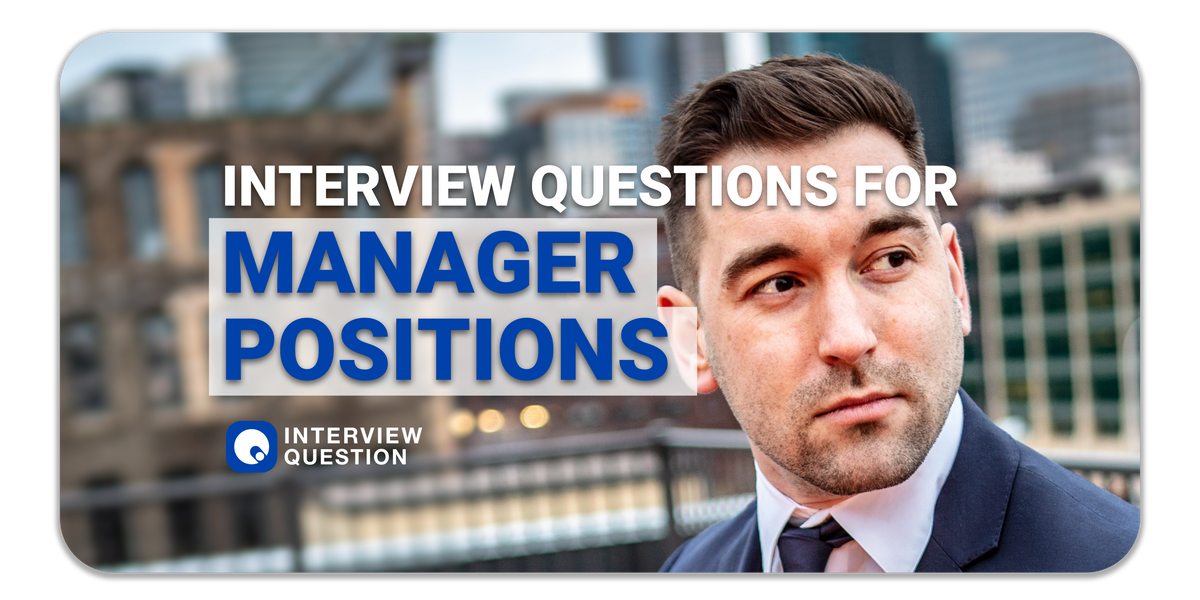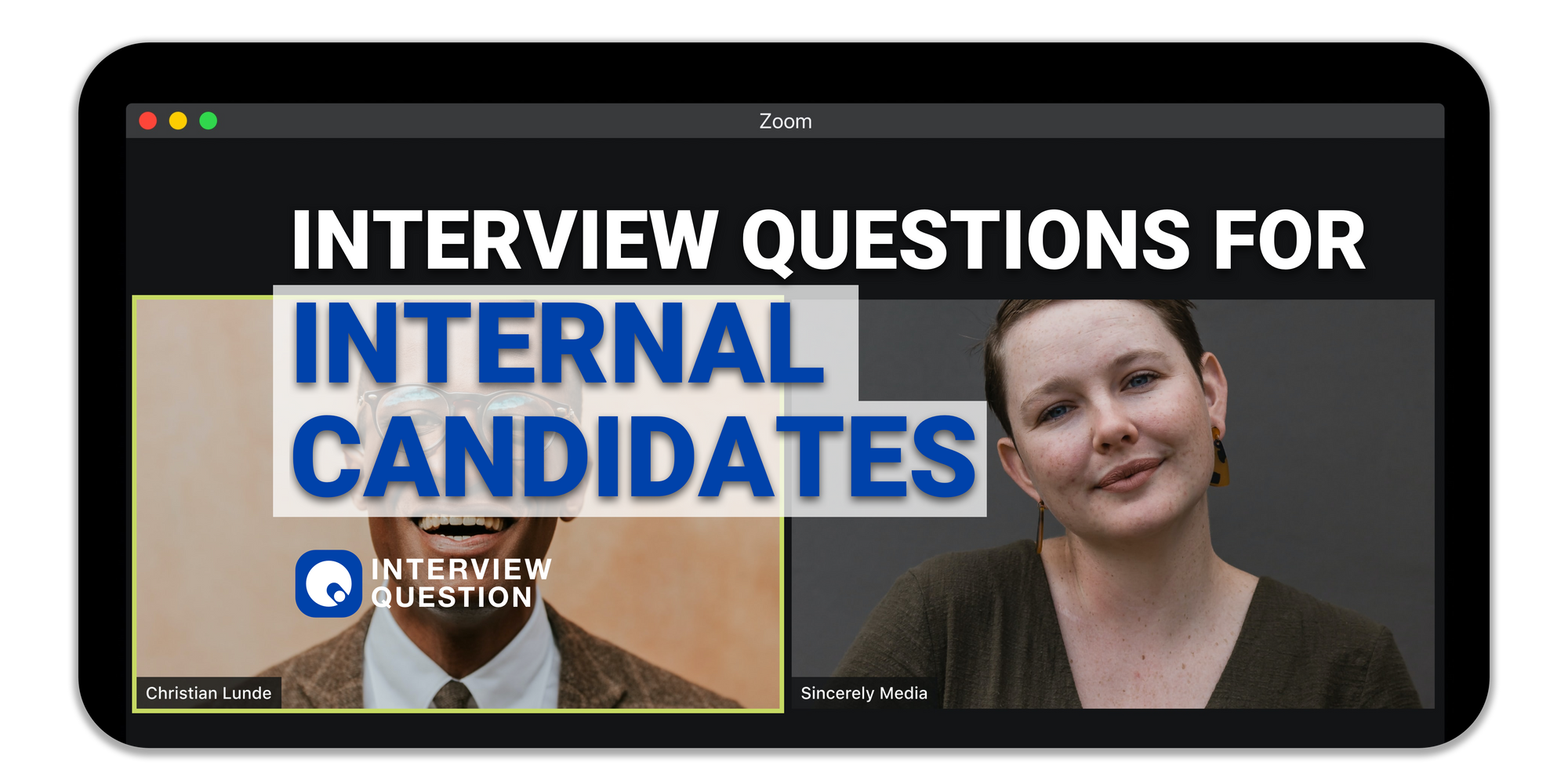Interview Questions for a Manager Position
Strengths | What you seek in an organisation | Work ethic | Significant contributions | Describe leadership style | Leader vs Manager | Conflict management | Your previous boss

The hiring process of employees in a management position will often include questions about management styles, soft skills, communication styles, performance and their approach in handling difficult situations.
Managers need to fit into the company culture and behave appropriately in-line with external image the upper management wants to present to the public, its customers and its suppliers.
Such questions heavily test the emotional intelligence of the applicant. Thus, it is extremely important that hiring managers know which kinds of questions to ask. Any potential hire should prepare the answers to the curveball questions before they enter the interview room.
In this article, we share the common interview questions potential managers will face.
What are your strengths?
This is a standard question asked by employers who want to know what makes the applicant tick and what their strengths are. Reading the question and assessing the answer will help the interviewer understand what types of leadership qualities and skills could be beneficial to him or her in the future. The interviewer is also able to learn whether the person demonstrates a positive attitude towards his job, even during tough times.
Some direct experience is useful here in substantiating your strengths. An informative answer should elaborate on constructive feedback and learning experiences.
This question is further used to see if the candidate is aware of his or her own strengths and weaknesses in their management styles and if he or she has the soft skill to self-evaluate. The interviewer also wants to be sure that the person will put forth his or her best effort even in difficult circumstances. It is helpful here to highlight what you’ve learned from a personally challenging experience at work, such as a failed project or crisis situation.
Note that it is okay to share your failures during a job interview, even for management positions, because the interviewer will usually only be interested in how you handled the particular situation, what you learned from it, how you grew and what your approach is to problem-solving. There is no intent for blame and shame here.
If you are applying for an internal position within your organization, then you may want to pull up info from your past performance reviews and also highlight key projects you were involved in to bring attention to your strengths. You can read more in this article below.

What are you looking for in an organization?
This is a question that will be used to test the honesty, integrity and self-awareness of any potential hire manager. Some people may try to answer this question in an inappropriate manner by mentioning their ideals. But no organisation is faultless, no perfect job and everyone has their flaws.
One of the main objectives of these questions is to get deeper insight into a candidate's interpersonal skills, emotional intelligence, ability to determine what other people might be thinking or feeling and how they can then reach out to them.
Potential hires need to be quick to realise that this is actually a trick question that was initially phrased as "what are the weaknesses in the company you are applying for?" and not fall into the trap. In fact, the interviewer is seeking suggestions and solutions to their problems, and wants to know if the candidate knows what their weaknesses are and if they have done any deep thinking about it or not.
Knowing what a managerial candidate seeks out in an organisation can help interviewers see if there is alignment and compatibility between the company and the individual.

Since the individual has personal goals which may not always be aligned to the corporate company goals, understanding a candidate's core values and motivations early in the interview process helps to determine if the candidate is a good fit. Goal alignment further reduces the chances of a social disconnect and needlessly raising the turnover rate of the company.
At this point, you can also ask the employer about their expectations and their departmental goals to make sure you are applying for the right job, and also for a job which you feel you can perform well at. You've got to be on the same page as them.
How would you describe your work ethic in one word?
Work ethic is a behavioural interview question topic. Not only is it an interesting topic that is not often asked during job interviews, it can be also given serious consideration by employers interested in the attitude of an employer.
Responses to this question can also be used during references as well, so it is important to carefully think about how you would describe your work ethics and practice them in your everyday life. This question will also test if a person is honest and sincere enough to admit their faults and shortcomings, especially if they are aware of them.
In the pursuit of hitting targets and demonstrating work output against Key Performance Indicators (KPI), a newly minted manager may bend the rules to achieve results faster. In asking an interviewee about their work ethic, it enables hiring managers to understand how they will apply their own values into the workplace.
- Will they be compromising integrity?
- Will they be compromising their personal life, health or relationships?
- Will they be compromising their morals and values?
- Will they be sacrificing company resources for personal gain?
A good work ethic should include working hard, working smart, being responsible for your actions, inspire others with your diligence in work and have a genuine interest in the success of the organisation.
These manager interview questions will help to determine if the person is a fit for a certain job. Some candidates may show the propensity of abusing their power in a management role, while others may tend to stick to the rulebook too closely such that his team underperforms. Such a question on work ethic and integrity allows the organisation filter through the applicant pool and will hopefully result in a successful hire.
What is the most significant contribution that you have made to the company/team where are currently employed?
Managers are often the enablers in the company. Here, you should talk about your leadership experience and how you have taken initiative and led a team through crisis situations without losing the team’s morale.
In your previous work experience, did you address an issue promptly, or were you able to successfully lead a team through a challenging situation? The interviewer wants to know how you deal with difficult people and circumstances, and how you develop your team to help it succeed.
The "openendedness" of this question also makes it apparent on what kind of communication style a manager will adopt when he or she tries to flaunt their achievements to their superior.
Letting the candidate talk on their own and having the manager sit there and quietly listen (or even just nodding their head), can sometimes be more revealing than the answer that is eventually given. Much like an investigation, you want to let the suspect simmer in-wait and leave them in suspense.
How would you describe your leadership style?
The interviewer is interested in your personal values, approach to problems, the reasons behind your behaviours and thinking process.
A good leader should be able to motivate his or her team members to work together towards a common goal with a positive outlook and mental attitude; he or she should also know when it’s appropriate to give instructions and when it’s best to let the team do their job.
When asked on how a difficult employee should be managed, the ideal applicant usually speaks about discipline, communication and integrity as the key ingredients.
A good leader will also be willing to bring in experts and specialists to help solve an issue at hand and should also do so even if it means that he or she is not being fully compensated for the expenditure.
Follow up questions to the topic on leadership skills and style would likely broach on handling underperforming teams, the candidate's ability in public speaking, delivering bad news to teams and designing action plans in constrained situations with very limited resources or budget cuts. Assigning a junior manager to a more senior, experienced team could be a situational question posed to a candidate to give them a theoretical taste on the uncomfortable situation he or she may be put in.
Having some inkling on how to handle cases like these are often very situational and are handled on a case-by-case basis.
If the candidate is okay with all these, you may have a winner.
However, if a candidate were to offer suggestions and provided reasoned explanations, most interviewers would be satisfied with the response. Personal examples from previous experience would make the discussion more realistic. If candidates were to provide answers that are too vague or overly technical or theoretical, the interviewer may see it as a red flag.
What is the difference between a leader and manager?
This is an interesting question that can have many different answers depending on the company’s philosophy, culture and structure.
You can touch on topics on leader versus follower, building a positive team culture, how delegating tasks distinguishes leaders from managers and why a hands-off approach without micromanagement could be the ideal management style.
A successful candidate should also discuss on how he promotes team safety, growth and development.
Overall, when comparing a candidate, an interviewer will try to determine if the person being assessed fits the profile of either the leader or the manager.
This question is further beneficial in finding out what kind of manager would you be for the company and why you would be a good fit for it. The interviewer wants to know if the candidate has the potential to develop a team and ensure their continued growth, as well as wants to know whether he/she has a track record of learning from mistakes so they don’t repeat them in other areas of management.
How do you handle conflict with a colleague or customer (or when things don't go as planned)?
Effective communication skills is a requirement to handle performance issues in subordinates whereas a tactful choice of words are needed when speaking to a disgruntled customer.
This is an important management interview question as it helps determine if the candidate has the ability to communicate with all kinds of people, and whether he or she can be discerning even when things don't go as planned. This also shows how well-versed the candidate is in handling different situations and keeping cool under pressure.
Any real-life examples of past experience would be beneficial here in demonstrating how a person would address confrontations and defuse it without losing their calm or becoming volatile.
Ideally, this is one of the interview questions for managers that will help in determining whether the manager has a strong temperament, self-control and careful planning when handling conflict with other people.
It would also be beneficial to know whether they are confident in themselves and their abilities to interact with individuals from different backgrounds while also understanding what motivates each of these individuals on a deeper level.
Managers should also know that they will never have all the answers to questions posed. Therefore, any new manager must be able to perform and act appropriately based on whatever information they have on hand to make a sensible, logical decision on behalf of the company.
What did you like best/worst about your last boss?
Understanding what made a candidate dislike (or like) his or her previous bosses will help the hiring manager to understand how that particular person relates to his or her employer and co-workers. Be aware that your past colleagues and superiors may become your job application references due to the connection HR has.
In some cases, the candidate may be demanding and not afraid to back his or her opinions as they see fit.
However, in other cases, they may also be timid when it comes to expressing their opinions.
If a manager prefers to listen to others over speaking out of turn or making decisions without consulting others, this is an example of how well the candidate would work with people and delegates tasks accordingly.
Redesign this job position, and tell us what responsibilities you think you should have.
Interviewers can ask you to scope your own job. This can really trip up some interviewees. Most candidates don't expect the hiring company to ask them to do job redesign of the position they are applying for.
In rescoping your job (or of any jobs, in fact), be extra careful. Don't overreach to assign responsibilities that will be overbearing. Heavy workload can wreck performance. Design a semi-perfect job that does what the organisation requires - based on overarching goals, coordination needs. Your proposed position may not be ideal, but it should be close to what the bosses have in mind.
Conclusion
This is a categorical perspective to the sort of available interview questions for a manager position. These interview questions are usually left to the last, as closing questions that will leave an impression.
These questions are designed to elicit an accurate answer to determine how well the candidate from different backgrounds will interact with office members and co-workers, and where possible, predict how successful they will be within the boundaries set out by their managerial responsibilities.
These questions also aid in finding out whether the person has good leadership skills, soft skills and communication skills that are necessary to being an effective manager.
Hopefully they have been helpful to you.
You may want to continue your reading here - more about the other common interview questions that are frequently asked by interviewers.


